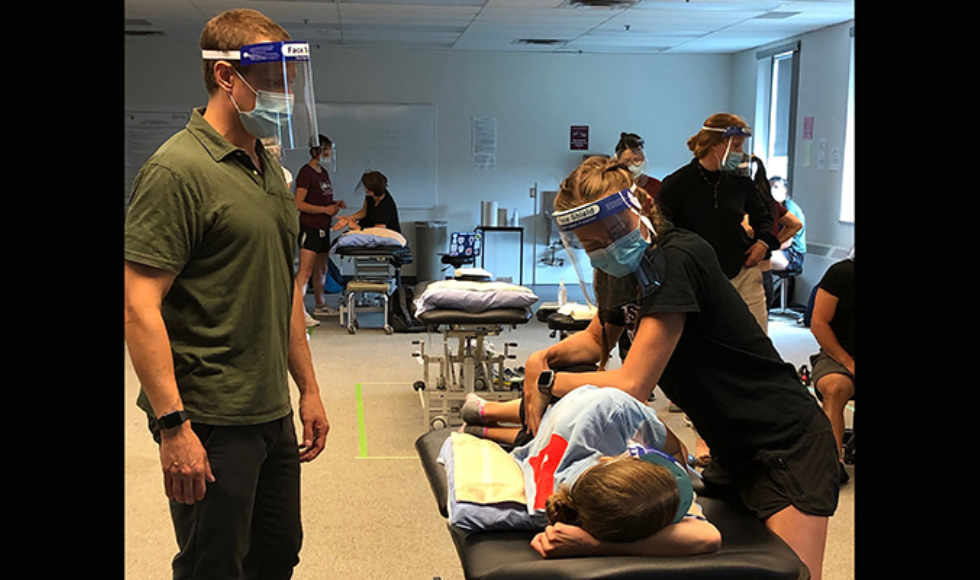Boot camp prepares physiotherapy students for the front line of health care

Physiotherapy student Mackenzie Holden, right, practises her technique on classmate Maddie Fyfe with instructor Colin Walsh Oczkowski during physiotherapy boot camp. Photo by Sarah Wojkowski
Physiotherapy students are busy doing hands-on learning this month in a boot camp that will get their clinical training up to date.
The master’s students are coming on campus to the School of Rehabilitation Science in the Institute of Applied Health Sciences for the program.
Offered in two sessions from early July to early August, the boot camp is allowing approximately 60 second-year students to complete their hands-on learning before heading to their final clinical placements and enabling approximately 60 first-year students to reinforce their virtual lessons as they enter their final year.
“Being back in the classroom allows our learners to refine how they will manage not only working as health-care providers in a clinical environment but also working with patients as they wear personal protective gear,” said Sarah Wojkowski, acting assistant dean of McMaster’s physiotherapy program and associate professor of the School of Rehabilitation Science.
“It also allows them to apply all the learning that has been done virtually over the past few months.”
Planning for this eventual return to the classroom with all the proper safety protocols started several months ago in the School of Rehabilitation Science. Physiotherapy is the school’s first program to return for a condensed, hands-on boot camp.
“We had the idea for this boot camp back in April, as we need to allow students to come together, learn and move forward in their careers,” said Dina Brooks, vice-dean of the Faculty of Health Sciences and executive director and professor of the School of Rehabilitation Science.
“We knew the second-year learners wouldn’t be able to graduate unless we could teach hands-on, clinical skills in person, so we planned it all out and did a lot of work for it to be able to go ahead.”
The boot camp looks much different than the learning environment the students left before the pandemic. Students are screened for the virus each morning and wear non-surgical masks and face shields in the classroom.
Working in pre-determined small groups, or “bubbles,” groups of students work at least six feet apart in three classrooms for stretches of two to three hours per day. Hand sanitizer stations, single-use washrooms and directional-marked hallways are also the new norm.
Faculty members and sessional faculty, who are also in appropriate personal protective equipment (PPE), lead the hands-on education in person.
“Our faculty and students have been phenomenal and have been extremely understanding of the precautions that need to be in place to maximize their safety,” said Wojkowski.
“Our senior students are people who in less than six months will become part of the front line in health care so I think the opportunity to learn from one another and see how to prepare to be safe is important, and they realize that.”
Maddie Fyfe, a second-year physiotherapy student, was thankful to get back into the classroom, especially as it allowed her to ask questions and receive feedback on her technique. She is heading into her final clinical placement at the McMaster Children’s Hospital in the Pediatric Intensive Care Unit.
“Everyone involved in the McMaster Physiotherapy Program has worked extremely hard to make this boot camp possible,” said Fyfe. “Hands-on learning is a foundation of our program and profession, and we are extremely appreciative that we have faculty and staff who are such strong advocates for our education.”
Mackenzie Holden, who is also in her second and final year, is preparing for her final clinical placement at a clinic in Stoney Creek working in orthopedic and sports injury rehabilitation. She said the boot camp opened her eyes to how to be a health-care provider during a pandemic.
“In addition to what we have learned about PPE and clinical practice during COVID-19, I have gained a deeper appreciation for what the first-line workers have been experiencing over the last few months,” Holden said. “During times like these, teamwork and support are pivotal to overcoming such change to the face of our profession, and this boot camp is the perfect example of that.”

